Common diseases and health problems with goats can be caused not only by various types of organisms (viruses, bacteria, protozoa or worms) but also by poor nutrition. For example, poor nutrition is the most common cause of abortion in goats.
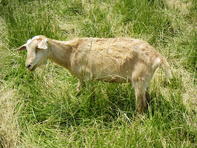
Problems in goats characterised by sores include abscesses, foot abscesses and orf. Some diseases may cause a secondary disease, for example, orf and mastitis.
Goat kids may spread orf from their mouths to the teats of their mothers. These does are more likely to develop mastitis. Some diseases may show similar symptoms; goats with tetanus, bluetongue and heartwater can all show nervous signs such as twisting their bodies. While diarrhoea is a symptom of coccidiosis as well as an infestation of worms.
It is therefore important to be able to differentiate and recognise the symptoms of goat diseases. Some diseases are best prevented through vaccination such as pulpy kidney and tetanus and a proper vaccination program may prevent other goat diseases and internal pest infestations. Ask your veterinarian or animal health care technician.
Abortion
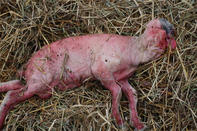
Abscess
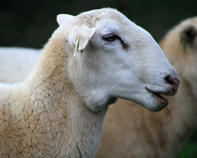
Foot Abscess
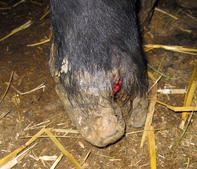
Orf
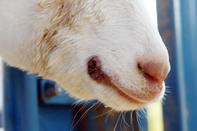
Orf (or ‘sore mouth’) is a viral infection of the skin and mucous membranes (eyes, mouth, nostrils and teats) of sheep and goats. Orf can also spread to humans.
Keep orf animals away from the rest of the herd and treat the scabs with Vaseline (wear gloves) or an antibiotic spray. Vaccination may prevent orf spreading to the rest of the herd.
Mastitis
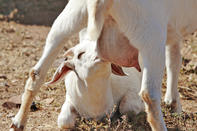
Mastitis is a very painful inflammation of the udder. Symptoms include fever, depression, reduced appetite, and not allowing kids to suckle. The udder will be red and swollen and milk may be thin and watery or bloody and thick with clots.
Alternate a hot compress (hot water bottle) with a cold compress (ice pack in a towel) for 5 - 10 minutes each and treat with antibiotic injection into the muscle. Bottlefeed kids of mastitis mothers with clean healthy milk to prevent starvation. Do not mix mastitis milk with healthy milk.
Pneumonia
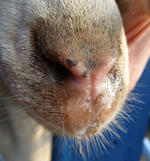
Pneumonia is caused by bacteria called Pasteurella and Mannheimia and may develop when goats are under stress conditions - bad weather, transportation, sudden changes in temperature. Symptoms include fever, shortness of breath, coughing, discharge from nose and difficulty eating.
Treat with a long-acting oxytetracycline product. Provide shelter during bad weather and when on long journeys, allow animals to rest, drink water and eat hay.
Pulpy Kidney
Pulpy kidney is a deadly disease caused by a bacteria and is often contracted by young animals. It usually follows after a sudden improvement in diet and appears quickly. Animals may show an unsteady gait and convulsions or may die quickly without showing any signs.
Treatment is usually too late but pulpy kidney can be prevented by introducing new food gradually. Doing a post-mortem (examination of the dead animal) may reveal soft pale coloured kidneys, red gas-filled intestines and an increased amount of fluid in the sac around the heart. Vaccinations against pulpy kidney are available.
Tetanus
Tetanus is caused by a bacterium infecting wounds and will cause stiffness of the limbs, restricted breathing and spasms. The head is bent backwards, reflexes to sound or touch is exaggerated and the third eyelid moves across the eye.
Wear gloves when treating animals - disinfect wounds, remove dead tissue and administer an antibiotic. Put animals in a dark, quiet area and give them food and water.
Bluetongue
This viral disease is carried by midges and often occurs after heavy rains and where conditions are warm and wet. Goats will show high fevers, swollen lips and may hold their necks at an awkward angle. In addition, tongues will be blue and red bands appear above the hooves.
Vaccinate against bluetongue in the spring (after kidding and not during thirst three months of pregnancy), keep goats from low-lying wet pastures and protect them from insects.
Heartwater

Coccidiosis
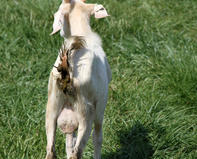
Coccidiosis is a disease of goat kids and lambs and often occurs due to dirty kraals and pens. The disease is found in manure and causes watery diarrhoea, dehydration and loss of appetite.
Separate all sick animals from the herd and treat coccidiosis with the correct remedy as advised by your vet. Treat dehydration with a mix of half a teaspoon of salt and 6 teaspoons of sugar in a litre of warm water. Give 250 - 500 ml 4 times daily for three days.
Roundworms
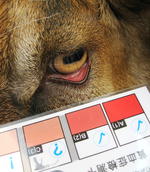
Tapeworms
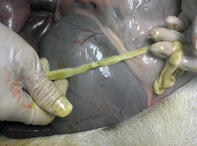
Liver Fluke
Liver flukes are flat, leaf-shaped worms found in the bile ducts in the liver of animals. Bottle neck, pale mucous membranes and weight loss are symptoms of liver fluke infestation. The life cycle of this internal parasite includes wet pastures and a specific snail.
Fence off wet areas and treat goats with a registered worm remedy. Please note: Information is for educational and informational purposes only and may not be construed as medical advice. The information is not intended to replace medical advice or treatment offered by your veterinarian.
By Marinda Louw